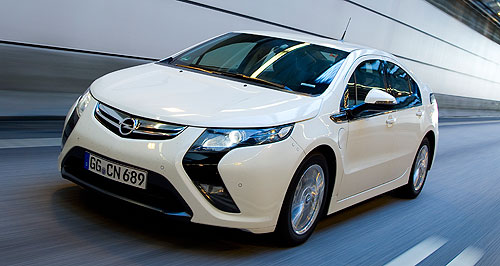News - OpelGM splits off Opel’s European operationsEuro trash: GM’s decision to place Opel in control of Europe could spell the end of the Opel Ampera, the German car-maker’s version of the petrol-electric plug-in hybrid Holden Volt. Opel takes reins to steer its own destiny, including Australian roll-out22 Jul 2014 By BARRY PARK GENERAL Motors has spun its European division into a separate business entity, responsible for markets as large as Russia as it pushes ahead with its plan to become the second-largest car-maker in the region behind Volkswagen. The newly formed Opel Group, which will operate separately from the Adam Opel car-making division, has been charged with steering GM’s European business interests, based out of Russelsheim – the same German city where the headquarters for the brand’s manufacturing operations are located. According to GM, the restructure will allow Opel to “strengthen its financial basis” after its flirtation with bankruptcy in the wake of the 2008 global financial crisis, and a struggle to build viable market share. “Today, we are more than just Opel/Vauxhall,” Opel Group chief executive Karl-Thomas Neumann said. “With the Opel Group, we align our organisational and legal entity structure in Europe with the business operations. “We streamline our decision making processes and increase our efficiency,” he said. Part of Opel’s new strategy is believed to be the axeing of the slow-selling Opel Ampera, a version of the petrol-electric plug-in hybrid Holden Volt that is modified for European tastes. US automotive news sites are reporting that GM plans to kill off the environmentally-friendly hatchback as early as next year as European sales for the first six month this year fall to just 332 units compared with sales of 3184 units last year. In Australia, the Holden Volt has pegged just 35 sales, down on the 67 sold in the first six months of last year, prompting similar questions over its long-term viability. So far this year, 114 electric cars have sold in Australia compared with 147 for the first six months of last year, compared with about 6000 hybrid vehicles. Mr Neumann said spinning off the European division as a standalone business was an important step in implementing Opel’s plans to increase its European market share from its current 5.6 percent to eight percent by 2022, as well as “another sign of confidence of our parent company GM”. As well, Opel has set itself a goal of increasing its profit margin to five percent, and further improving product quality, and customer and employee satisfaction. The Opel Group will consist of about 100 employees, with the company flagging that the restructure provided opportunity for “growth and employment” across its business. “The new Opel Group is a testimony of how important Opel has become for General Motors,” Opel said in a statement announcing the restructure. As well as building cars that will be re-badged as Holdens in Australia and New Zealand from next year, Opel will also sell vehicles branded as Buicks in the US. The Holden-owned Lang Lang proving ground in south-eastern Victoria is believed to be working on the development of a number of upcoming Opel models, including fine-tuning the cars for Australian roads. Early last month, Opel mapped out European-market growth plans that it said would return it to profit mid-decade while launching 27 new models and 17 engines by 2018. If it is successful, the moves will make Opel the second-largest brand in Europe behind fellow German car-making rival Volkswagen. Opel’s growth plans are also believed to tie in closely with parent company GM’s platforms, with the European car-making division retaining its role as a small-car specialist. GM has tipped more than four billion euro into Opel over the last 12 months in an effort to shore up its European operations, and similar to Holden's fate in Australia, announced the closure of under-performing European factories.  Read more |
Click to shareOpel articlesMotor industry news |

















Facebook Twitter Instagram